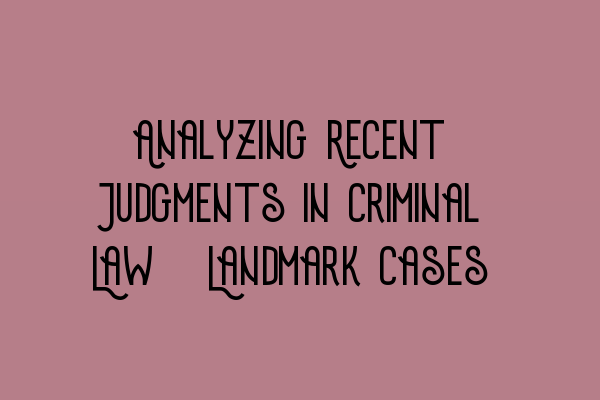Analysing Recent Judgments in Criminal Law: Landmark Cases
Welcome to the SQE Criminal Law & Practice Law UK blog, where we provide valuable insights into the latest judgments and landmark cases in the field of criminal law. Our team of highly-qualified solicitors, writers, and SEO experts is here to guide you through the complexities of criminal law, ensuring you stay well-informed and up-to-date.
In this blog post, we will delve into some recent judgments that have had a significant impact on the landscape of criminal law. These cases have set important precedents, shaping the way criminal cases are understood, adjudicated, and litigated. Let’s jump right in!
The R v Adams Case: A Watershed Moment in Criminal Law
One of the most influential recent judgments in criminal law is the R v Adams case. This landmark decision addressed the issue of criminal liability in cases of involuntary manslaughter.
The court’s ruling clarified the legal test for establishing gross negligence manslaughter and defined the obligations of individuals in positions of responsibility. It highlighted the importance of recognizing and fulfilling duty of care, particularly when it comes to public safety. This judgment has since been widely cited and has significant implications for future cases.
The R v Johnson Case: A Step Towards Ensuring Fair Trials
Another recent case that has garnered attention and discussion within the legal community is the R v Johnson case. This judgment addressed the admissibility of evidence obtained through surveillance technology, specifically the use of CCTV footage in criminal proceedings.
The court, in its ruling, recognized the potential for abuse and violation of privacy that comes with the use of surveillance technology. The judgment set out clear guidelines on the admissibility of such evidence, ensuring that the rights of the accused are protected and that fair trials are conducted.
The Impact of the R v Lewis Case on Self-Defense
Self-defense is a crucial aspect of criminal law, and recent judgments have played a significant role in shaping its interpretation. One such case is the R v Lewis judgment, which addressed the issue of justified use of force in self-defense.
The court’s ruling emphasized the importance of proportionality and reasonableness when assessing whether the use of force was justified. It clarified the circumstances in which a person can claim self-defense and established a clear framework for evaluating the reasonableness of their actions. This case has provided valuable guidance to legal professionals and individuals involved in self-defense situations.
Stay Informed: SQE Exam Dates and Preparation Courses
If you are a law student or aspiring solicitor looking to enhance your knowledge and prepare for the SQE exams, we offer comprehensive SQE 1 preparation courses that cover all key areas of criminal law. Our expert tutors will guide you through the curriculum, helping you gain a deep understanding of criminal law principles and case precedents.
For those preparing for SQE 2, our SQE 2 preparation courses are designed to provide you with a solid foundation in criminal law practice. Our practical approach and mock exams will sharpen your skills and boost your confidence for the upcoming exams.
To ensure you stay up-to-date with the latest developments in the SQE exams, check out our SRA SQE exam dates. Mark these important dates on your calendar, and make sure you have ample time to prepare and revise.
Thank you for joining us today as we explored recent judgments in criminal law and how they shape the legal landscape. We hope you found this blog post informative and insightful. Stay tuned for more engaging content from SQE Criminal Law & Practice Law UK!
